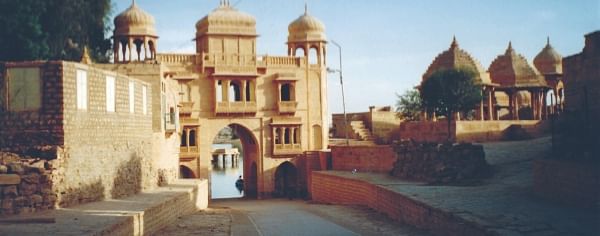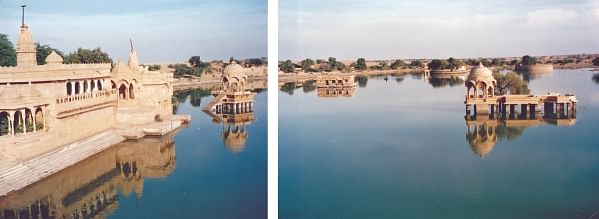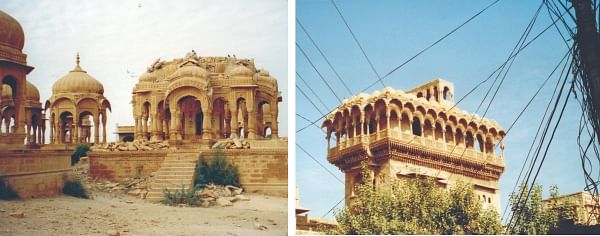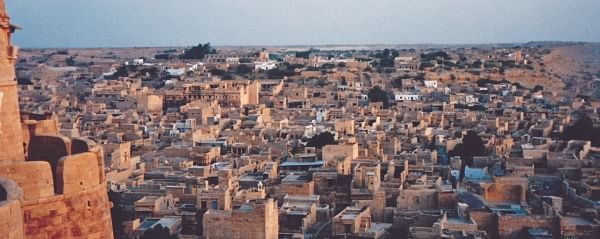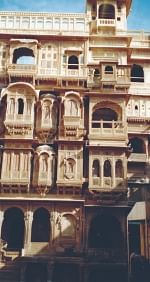| Home - Back Issues - The Team - Contact Us |
 |
| Volume 11 |Issue 51| December 28, 2012 | |
|
|
Travel
They Shall Have Seen Jaisalmer Andrew Eagle There could even be future predictions in those books. Who's to say there isn't? Who's to say what wisdom is there, in the rare manuscripts and ancient tomes of the libraries of Jaisalmer, where the dry desert air is favourable to conservation? Yet here, I embark upon a far humbler task: of predicting the past. As once there came tribesmen into the arid territories of the Thar, as once there came herdsmen driving cattle and flocks of goats to forage among the thorny, scrubby bushes and desert grasses of that marginal country; as once there came wayfarers and traders from east and west, with textile, gemstone and treasure chest; so it shall come to pass that western backpackers, two, shall arrive in a white Ambassador that shall have been hired from Something-or-Other Tours & Travels in Delhi.
Over the centuries, in places where wells and tanks have been dug and there is water to drink, settlements shall have emerged and, gradually, a small but dignified desert kingdom shall have been established. There shall be palaces and forts built for the Bhati Rajput royalty and the capital shall have taken the name of its founder, Maharawal Jaisal Singh. At a time long after the camel caravans from Central Asia, Africa and Egypt have ceased to come; long after the several neighbouring kingdoms have been combined into Rajasthan, the land of the kings; and many years after the Pakistani border has been etched across the map, the backpackers shall have reached Jaisalmer to see all that has gone before them. And they shall have with them a driver, who in his previous life was a bear. That very driver shall have steered the Ambassador in safety across the nearer Rajasthani plains, dodging camel cart and swerving around cattle herd; and he shall have stopped to undertake urgent on-road mechanical tinkering as they navigated the ribbons of tar of the Thar. In Jaisalmer, so shall it have been that they took rest.
Let it be said that they shall have stayed in a hotel near the large tank to the city's south, the tank that's embellished with minor temples around its edges. They shall have heard the rumour that the main gate to the tank was presented to the Maharawal by a well-to-do lady-of-the-night, and when he disagreed to its construction due to considerations of propriety, she did it anyway, while he was away, incorporating a Krishna Temple in its uppermost storey so that he could not object to passing beneath it. Let it be written here that they shall have enjoyed one sunset at the tank and have found the following sunrise while eating breakfast on the hotel rooftop, with views to the fort and the old city within its walls. Let it be known how they visited that city of laneways, with its Jain temples and its haveli mansions in filigree design, of delicate craftsmanship, that shall have been constructed long before by the once wealthy families of trade. By the time of the Ambassador's arrival, the city in all its history shall be there, perched upon its hilltop in the Thar, Jaisalmer: the golden city.
So too shall they have visited the shops of souvenirs and desert jewellery in turquoise gemstone, silver and lapis lazuli. They shall have known the carpet stores where dozens of carpets are to be unfurled upon arrival, as potential customers sip tea. They shall have met the Singaporean ladies, three, down from Kashmir; and they shall have heard the Singaporean critique that westerners usually prefer carpets in bold, contrasting colours. And it shall have amused them as the Singaporeans chose their own carpets in not less predictable pastel shades of aqua and rose. To each group shall be their own traditions. But it shall not have mattered in any substantial way, because the carpet stores are stocked for all comers, from the east and from the west.
Verily I say that on the third day they shall have organised a tour, by jeep and by camel, to the sand dunes of Sam. As His Royal Highness the Maharawal could tell you, winter nights in the desert are cool and the locality of Sam follows that pattern. But kindling for the campfire shall have been brought from afar, due to the lack of trees, and the locals shall have donned military type jackets and factory knitted shawls. The foreigners, meanwhile, shall have unrolled their technologically designed sleeping bags that come with guarantees of withstanding a specified number of minus degrees, the sleeping bags which their mothers shall have made them bring. They shall have slept in the open, with Australian pillows, under the Indian stars. And those foreigners shall know nothing, not how to survive in the desert nor even how to speak the Rajasthani tongue; but they shall have eaten well, the dinner prescribed by the tour agreement. Meanwhile the locals shall have busied themselves in poaching: cooking and eating a small desert deer. The locals shall have imbibed from desert wells while the foreigners had bottled water from a distant alpine spring. On the following day there shall have been camels, two, for the ride back into town, a ride of several hours, and I tell you they are tall beasts such that when the camel one is sat upon is elderly, with arthritic knees causing it to sometimes stumble on rocky ground, when there is the sound of leg bones creaking as it walks, it's not an altogether calming experience. "Does he ever actually fall over?" shall have been asked in sign language, as best it could be done. "Sometimes," the camel driver shall have made him to understand by way of reply. And the he-camel shall have passed beside she-camels and there shall have been bellowing, camel lips inverted with bubbling froth welling up from a camel mouth. Camels live for about twenty years, they shall have heard, with a working life from two to sixteen. So let it be recorded as it shall have been done. It is my past prediction. They shall have seen Jaisalmer.
|
||||||||||||
Copyright
(R) thedailystar.net 2012 |
|||||||||||||
